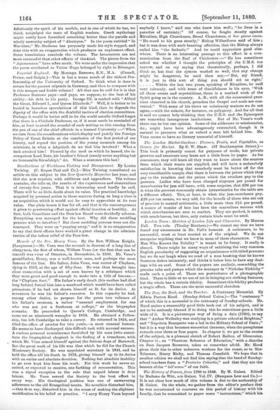Memoir of the Rev. Henry Venn. By the Rev. William
Knight. (Longmans.)—Mr. Venn was the seventh in descent of a long line of clergymen, the first of whom, William Venn (or the first that can be traced) was vicar of Otterton, in Devonshire, in 1599. Mr. Venn's grandfather, Henry, was a well-known man, and perhaps the most famous of the line. His father, John -Venn, was rector of -Clapham, dying in 1818, at the age of fifty-four. He was thus brought into close connection with a set of men known by a sobriquet which they were great and good enough to make into a title of honour,— the " Clapham Sect." His father's early death (his mother had died long before) forced him into a manhood which would have been called premature, if he had not shown himself so fit for its duties. At seventeen he was his father's executor. In this capacity he had, among other duties, to prepare for the press two volumes of his father's sermons, a rather "unusual employment for one who was not yet a freshman at college," as the biographer remarks. He proceeded to Queen's College, Cambridge, and came out as nineteenth wrangler in 1818. He obtained a Fellow- ship, but left Cambridge to take a curacy. He returned in 1824, and filled the office of proctor for two years,—a most unusual honour. He seems to have discharged this difficult task with unusual success. A curious personal reminiscence furnished by his sons (who contri- bute the biographical chapter) is the finding of a truncheon, with which Mr. Venn armed himself against the furious dogs of BarnwelL But the great work of his life was that which he did for the Church Missionary Society. He was appointed secretary in 1841, and he held the office till his death in 1873, giving himself up to its duties with an entire and absolute devotion. Nothing but absolute inability to go ever kept him from his work. For this work he never re- ceived, or expected to receive, one farthing of remuneration. This was a signal exception to the rule that nopaid labour is dear labour. Mr. Venn served the Society to the best effect in every way. His theological position was one of unwavering adherence to the old Evangelical tenets. No novelties disturbed him, —that is to say, disturbed him in the sense of making the slightest modification in his belief or practice. "I envy Henry Venn beyond anybody I know," said one who knew him well ; "he lives in a paradise of certainty." Of course, he fought stoutly against Ritualists, High Churchmen, Broad Churchmen, et hoc genus omne. "He stood to his guns stoutly," Bishop Wilberforce said of him ; but it was done with such beaming affection, that the Bishop always called him "the fatherly." And he could appreciate good else- where. There is an interesting passage to this effect in a com- munication from the Earl of Chichester :—" He has sometimes asked me whether I thought the principles of the C.M.S. too narrow, and on my saying that theoretically, perhaps, I did think so, but that the system worked so well, that any change might be dangerous, he used then say,—' But, my friend, it is just in this sort of thing you should set us right.'
Within the last two years, speaking of Ritualism, he said very solemnly, and with tears of thankfulness in his eyes, 'With all these errors and superstitions, there is a marked work of the Spirit going on in the country. A. B., with all the nonsensical prat,- tices observed in his church, preaches the Gospel and souls are con- verted." With some of his views on missionary matters we do not agree,—with the minute, for instance, on polygamy. And for all that is said we cannot help thinking that the C.M.S. and the Episcopate are somewhat incongruous institutions. But of Mr. Venn's work there can be but one opinion. Some of the addresses to missionaries, &c., might have been advantageously retrenched, though it is natural to preserve what so valued a man left behind him. Mr. Venn seems to have no literary memorial of himself.


































 Previous page
Previous page